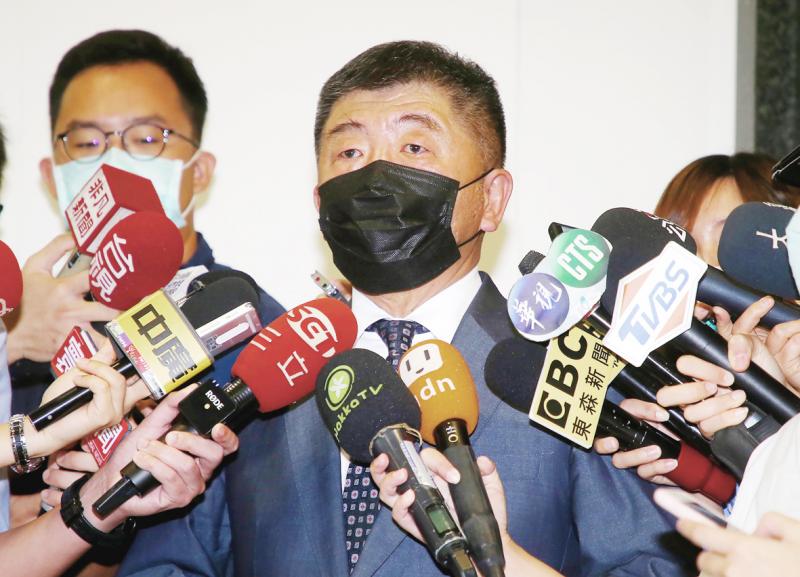The Central Epidemic Command Center (CECC) yesterday reported a case of a Taiwanese who tested positive for COVID-19 after arriving in Shanghai.
Centers for Disease Control (CDC) Deputy Director-General Chuang Jen-hsiang (莊人祥), who is also the CECC spokesman, said that the case is a woman in her 70s who lives alone in southern Taiwan and had been in Taiwan since November last year.
After arriving in Shanghai on Aug. 15 and testing negative for COVID-19, the woman was quarantined in a hotel, Chuang said.

Photo: CNA
On Friday last week, she developed a sore throat, so she was tested again, he said, adding that after the results came out positive on Saturday, she was isolated for treatment.
Chinese authorities on Monday informed the CECC, and the woman’s friends in Taiwan also informed the center about having had contact with the woman before she left for Shanghai, he said.
Thirty-three family members and friends have so far been identified, he said, adding that polymerase chain reaction tests of 14 people were negative, while the other tests are still being evaluated.
The woman told authorities that she stayed at home from Aug. 7 to Aug. 10, but that she had several meals with friends in the few days before departing for China, Chuang said.
Although the woman had been in Shanghai for a few days before the onset of her symptoms — so she probably did not infect others in Taiwan — the center would conduct contact tracing to verify whether she transmitted her infection and to clarify its source, he said.
Regarding a case of a Taiwanese boy who arrived in Shanghai on Aug. 14 and tested positive on Aug. 17, Chuang said that the boy had a fever on Aug. 15 and was tested every day from Aug. 15 to Aug. 19, but only the test on Aug. 17 came out positive.
On Friday last week, the boy was released from isolation and discharged from the hospital yesterday, he added.
Minister of Health and Welfare Chen Shih-chung (陳時中), who heads the CECC, said on the sidelines of an award ceremony at the ministry yesterday that COVID-19 could become seasonal, like the flu, when asked to comment on a person in Hong Kong on Monday being the first case of COVID-19 reinfection.
Hong Kong researchers on Monday reported that a 33-year-old man, who was confirmed to have COVID-19 in late March and tested negative by mid-April, tested positive again after returning to Hong Kong from a visit to Europe, and that genome testing suggested that he had become infected with a different strain of the virus.
He had mentioned before that academics are arguing over whether COVID-19 might become more like SARS, with a higher mortality rate, or more like the seasonal flu, which has co-existed with humans for a long time, Chen said, adding that the Hong Kong case seems to indicate that it might be more like the flu.
If that is the case, Taiwan has a lot of experience fighting the seasonal flu, and the CECC would run simulations and make proper preparations, he added.

The manufacture of the remaining 28 M1A2T Abrams tanks Taiwan purchased from the US has recently been completed, and they are expected to be delivered within the next one to two months, a source said yesterday. The Ministry of National Defense is arranging cargo ships to transport the tanks to Taiwan as soon as possible, said the source, who is familiar with the matter. The estimated arrival time ranges from late this month to early next month, the source said. The 28 Abrams tanks make up the third and final batch of a total of 108 tanks, valued at about NT$40.5 billion

A group from the Taiwanese Designers in Australia association yesterday represented Taiwan at the Midsumma Pride March in Melbourne. The march, held in the St. Kilda suburb, is the city’s largest LGBTQIA+ parade and the flagship event of the annual Midsumma Festival. It attracted more than 45,000 spectators who supported the 400 groups and 10,000 marchers that participated this year, the association said. Taiwanese Designers said they organized a team to march for Taiwan this year, joining politicians, government agencies, professionals and community organizations in showing support for LGBTQIA+ people and diverse communities. As the first country in Asia to legalize same-sex

Travel agencies in Taiwan are working to secure alternative flights for travelers bound for New Zealand for the Lunar New Year holiday, as Air New Zealand workers are set to strike next week. The airline said that it has confirmed that the planned industrial action by its international wide-body cabin crew would go ahead on Thursday and Friday next week. While the Auckland-based carrier pledged to take reasonable measures to mitigate the impact of the workers’ strike, an Air New Zealand flight arriving at Taipei from Auckland on Thursday and another flight departing from Taipei for Auckland on Saturday would have to

MOTIVES QUESTIONED The PLA considers Xi’s policies toward Taiwan to be driven by personal considerations rather than military assessment, the Epoch Times reports Chinese President Xi Jinping’s (習近平) latest purge of the Chinese People’s Liberation Army (PLA) leadership might have been prompted by the military’s opposition to plans of invading Taiwan, the Epoch Times said. The Chinese military opposes waging war against Taiwan by a large consensus, putting it at odds with Xi’s vision, the Falun Gong-affiliated daily said in a report on Thursday, citing anonymous sources with insight into the PLA’s inner workings. The opposition is not the opinion of a few generals, but a widely shared view among the PLA cadre, the Epoch Times cited them as saying. “Chinese forces know full well that